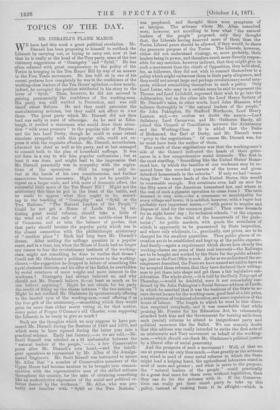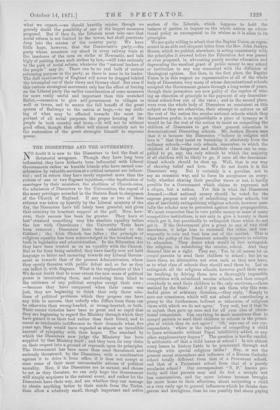TOPICS OF THE DAY.
MR. DISRAELI'S FLANK MARCH.
WE have had this week a great political revelation. Mr. Disraeli has been proposing to himself to outflank the Liberals by carrying out, or trying to carry out, now at last that he is really at the head of the Tory party, some of the less visionary suggestions of " Coningsby " and " Sybil." He has often referred with great complacency to the policy of the Tories in bringing in the Ten Hours' Bill by way of an answer to the Free Trade movement. He has told us in one of his recent prefaces how completely he was in the confidence of the working-class leaders of the Ten Hours' agitation,—how nearly, indeed, he occupied the position attributed in his story to the lover of " Sybil." Then, however, he did not succeed in gaining permanently the confidence of the working-men. His party was still wedded to Protection, and was still timid about Reform. Ho and they could patronize the manufacturing artizans, but they could not affect to trust them. The great party which Mr. Disraeli did not then lead was sadly in want of education. As he said at Edin- burgh, it needed a statesman who would draw their atten- tion " with some pressure " to the popular side of Toryism ; and the late Lord Derby, though he could to some extent simulate sympathy with this popular side, could not ex- press it with the requisite effusion. Mr. Disraeli, nevertheless, educated his chief as well as his party, and at last managed to commit both to the plan of household suffrage. It was not done in a way to win him popular enthusiasm ; but at least it was done, and might lead to the impression that Mr. Disraeli personally was in sympathy with the aspira- tions of the operatives. Still he reaped only de- feat at the hands of his own constituencies, and further manoeuvres became necessary. Might it not be possible to repeat on a larger scale, and with more of dramatic effect, the successful little move of the Ten Hours' Bill ? Might not the aristocracy this time be put in the front of the battle, and be made to appear what they ought to be, accord- ing to the teaching of " Coningsby " and " Sybil or the Two Nations," " The Natural Leaders of the People " ? Could he not get a House of Lords that, by ini- tiating great social reforms, should take a little of the wind out of the sails of the too middle-class House of Commons, and so trim the balance of parties, that that party should becotne the popular party which was in the closest connection with the philanthropic aristocracy of " another place " ? Such had long been Mr. Disraeli's dream. After settling the suffrage question in a popular sense, and in a time, too, when the House of Lords had no longer any reason to fear the revolutionary instincts of the working- class, might not something be done to realize that dream ? Could not Mr. Gladstone's political overtures to the working- classes,—the suggestion he dropped in debate of something like equal electoral districts, and his offer of the Ballot, be overbidden by social overtures of more weight and more interest to the workman f Coningsby had always believed so, and why should not Mr. Disraeli believe it—at least as much as he can believe anything ? Might he not obtain for his party the credit of filling up the chasm between " the two nations "? Might he not outflank Mr. Gladstone by spontaneously offering to the dazzled eyes of the working-men,—and offering it as the free gift of the aristocracy,—something which they would prize far more than either secret voting or, for that matter, every point of Fergus O'Connor's old Charter, even supposing the Liberals to be ready to give so much ?
Such are the thoughts which we may suppose to have pos- sessed Mr. Disraeli during the Sessions of 1869 and 1870, and which seem to have ripened during the latter year into a practical scheme. Early last January,—so we are told,—Mr. Scott Russell was selected as a fit ambassador between the "natural leaders of the people,"—i.e,, a few Conservative peers after Mr. Disraeli's own heart,—and the intelli- gent operatives as represented by Mr. Allan of the Amalga- mated Engineers. Mr. Scott Russell was instructed to assure Mr. Allan that " a number of Conservative members of the Upper House had become anxious to be brought into commu- nication with the representative men of the skilled artizans throughout the country, for the sake of obtaining something like an authoritative expression of the social and political re- forms desired by the workmen." Mr. Allan, who was pro- bably not familiar with " Sybil or the Two Nations," was perplexed, and thought there were symptoms of an intrigue. The artizans whom Mr. Allan consulted were, however, not unwilling to hear what "the natural leaders of the people " proposed, only they thought that, the Liberals having deserved more of them than the Tories, Liberal peers should be allowed, if they would, to share the generous purpose of the Tories. The Liberals, however, either did not understand strategy, or, more probably, their leaders being in power, and therefore much more directly respon- sible for any sanction, however indirect, that they might give to such a movement than the chiefs of Opposition, they held aloof, for, as followers, they did not wish to commit themselves to a policy which might embarrass them in their party allegiance, and
they could not accept large and perhaps revolutionary social mea- sures, without committing themselves to such a policy. Only Lord Lorne, who may in a certain sense be said to represent the Throne, and Lord Lichfield, expressed their wish to go into the deliberation, but on the other side the Lord Henry Sydney of Mr. Disraeli's tales, in other words, Lord John Manners, who believes thoroughly in " the natural leaders of the people," Sir John Pakington, Sir Stafford. Northcote, Lord Henry Lennox, and,—we confess we doubt the names,—Lord Salisbury, Lord Carnarvon, and Mr. Gathorne Hardy, all joined this Council of Conciliation between the Aristocracy and the Working-Class. It is added that the Duke of Richmond, the Earl of Derby, and Mr. Disraeli were, " privy to the negotiations." Of course Mr. Disraeli was, for he must have been the author of them.
The result of these negotiations was that the working-men's side of the Council indicated the heads of their griev- ances in a few comprehensive social demands. The first is. the most startling, " Something like the United States' Home- stead law, by which the families of our workmen may be re- moved from the crowded quarters of the towns and given detached homesteads in the suburbs." If only we had "some- thing like " the waste lands of the United States, this would be reasonable enough. But substitute even half an acre for the fifty acres of the American homestead law, and where is the cost of such a gigantic operation to come from ? The next demand is very wise,—for a commune or municipality for every village and town; it is saddled, however, with a vague but probably very important annex,—" with power to acquire and dispose of land for the common good." Then come demands for an eight hours' day ; for technical schools, " at the expense of the State, in the midst of the homesteads of the prole- tariat ;" for public markets, with goods the soundness of which is apparently to be guaranteed by State inspection, and where only wholesale, i.e., practically, cost prices, are to be charged for the smallest quantities. Then public places of re- creation are to be established and kept up at the public expense. And finally—again a requirement which shows how clearly the working-classes see some of their real interests—the Railways, are to be bought and worked by the State for the public advant- age, just as the Post Office is now. As far as we understand the ar- rangement described, the Peers we have named are said to have so far accepted these reforms, that they have declared their willing- ness to put them into shape and get them a fair legislative con- sideration. The whole story,—it is told by theDaily Telegraph of Thursday,—would be doubtful, were it not remarkably con- firmed by Sir John Pakington's Social Science address at Leeds, in which he asserted that it was the business of the State to se- cure decent homes for the working-men, good food at a fair price, a sound system of technical education, and some regulation of the hours of labour. The length to which he went in this direc- tion surprised everybody, and it was remarkable that while praising Mr. Forster for his Education Act, he vehemently attacked both him and the Government for turning aside from such (social) reforms to attend to insignificant party and political measures like the Ballot. We can scarcely doubt that this address was really intended to strike the first note of an aristocratic and Tory movement on behalf of the working- man,—which should out-flank Mr. Gladstone's political justice by a liberal offer of social generosity. And the prospects of such a movement ? Well, of that we can at present say only thus much,—that greatly as the artizans may stand in need of some social reforms in which the State might lend a helping hand, the agricultural labourers stand in need of more and greater ; and what is more to the purpose, the " natural leaders of the people " could practically do a great deal more for them even without legislation, than they can do for the artizans with it. If the Conserva- tives can really get their timid party to take up this policy, instead of rushing from it in affright—which is
what we expect,—we should heartily rejoice, though we gravely doubt the possibility of one of the largest measures proposed. But if they do, the Liberals must take care that social reform is not limited to the towns, but shall penetrate deep into the estates of the country party. We have little hope, however, that the Conservative party,—the party whose members cry aloud in every railway train at the insolence of the men on strike at Newcastle, and talk bigly of putting down such strikes by law,—will take seriously to the path of social reform, whatever the "natural leaders of the people " may do. There can be no real bulk of serious reforming purpose in the party, as there is none in its leader. The chill squirearchy of England will never be dragged behind the triumphal car of their viewy and literary chief. But even if this curious strategical movement only has the effect of forcing on the Liberal party the earlier consideration of some measures far more really useful and important than this wretched Ballot,—measures to give self-government to villages as well as towns, and to secure the full benefit of the great system of Railways to the nation at large,—to say noth- ing of what may be effected towards the most im- portant of all social purposes, the proper housing of the people in both country and town,—it will not be without good effect, though that effect will almost certainly not be the restoration of the great strategist himself to supreme power.



































 Previous page
Previous page